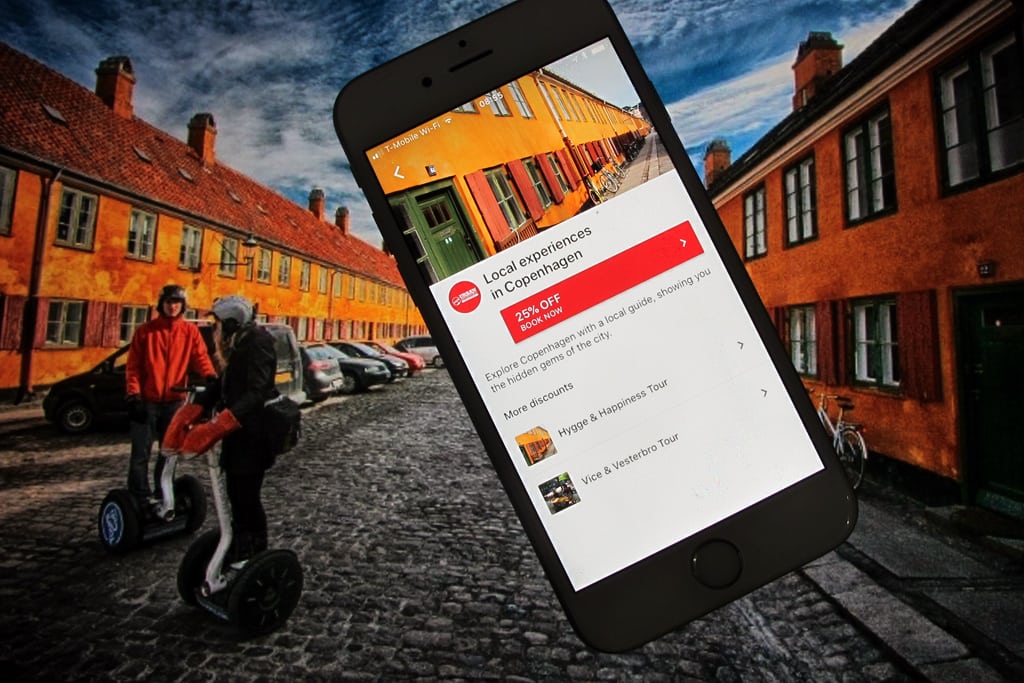Skift Take
Tours-and-activities startups will be eager to see if in-destination apps from giants such as Google, Airbnb, and TripAdvisor will succeed in providing cost-effective customer leads.
On Thursday, Google publicly revealed that it had updated its free mobile itinerary-planning app Google Trips with a new “discounts” tab. It now offers between 5 and 25 percent off selected tours, activities, events, and car rentals in major destinations.
The discounts come from direct partnerships arranged between Google and the booking platforms or companies providing them, said some of the participating companies. BeMyGuest, GetYourGuide, EatWith, Expedia, Klook, Musement, Peek, Tiqets, TripAdvisor, TripUniq, and Urban Adventures are among the companies involved.
The offers varied in nature in our checks on Thursday. Clicking a link to discounts from Berlin-based consumer marketplace GetYourGuide created a promo code for 20 percent off most purchases. The discount was automatically applied to its checkout page on its mobile website.
Yet clicking an “up to 30 percent off” link from Singapore-based distribution platform BeMyGuest for tours in Chicago offered a 9 percent discount off of a single attraction, a hop-on-hop-off bus tour.
For car rental, we saw offers in various cities from the small chains Holiday Autos. We saw airport transfers from companies like Holiday Taxis and Rideways also in some cities.
Small Step into a Big Sector
The move, while small, is notable as the company’s first expansion into the category of promoting tours-and-activities bookings.
The addition of tours-and-activities inventory matches Airbnb’s move from merely offering short-term rentals to also offering tours, activities, and restaurant reservations — with flights said to be in the works.
It also brings Google into a category that’s been in the spotlight this year, with TripAdvisor reporting record growth in tours-and-activities sales and booking platform GetYourGuide landing $75 million in funding while rival booking platform Klook netted a $60 million round.
Tours marketplace startups such as GetYourGuide and Klook have talked about how encouraging downloads of their mobile apps would be a way to circumvent a dependency on finding customers through the giants Google or Facebook.
By promoting tour marketplaces that offer discounts specifically for Google Trips users, Google risks grounding these startups down on margin right from the get-go as it tries to enter this sector — a non-intuitive strategy.
On the other hand, offering unique-to-the-app discounts to Google Trips users could cement usage and popularity of the app with travelers and, depending on the economics, be a more cost-effective lead-generation strategy for suppliers, who receive direct bookings.
Becoming an In-Destination Tool
The Google Trips app remains elegantly designed, offering to import your itinerary information from your Gmail account and provide model itineraries or destination inspiration based on when and where you’re traveling. Yet it has suffered from a lack of marketing promotion.
Google Trips is nowhere near as popular as several other free travel apps, according to downloads and ratings analyzed by market research firm AppAnnie. But it has gained far more traction than its previous effort, called Field Trip, which was a location-based app that meant to offer serendipity by revealing surprising aspects of places around a user.
In the UK this week, for example, Google Trips outranked Google Maps in downloads among the most downloaded and best-rated of travel category apps for Android devices, according to AppAnnie. But it was only 37th of the free Android travel apps in download ranking. The version of Google Trips for Apple devices is less popular worldwide, AppAnnie’s data said.
The Google Trips enhancement comes at the end of a year in which the company tested in desktop search vacation rental search and dynamic vacation package search, while revamping its flights search for desktop and fully rebuilding its hotel search for mobile.
Google also rolled out other tweaks to its travel product on Thursday. These include adding to its desktop search the option for consumers to receive mobile notifications about rate changes on specific hotels — a service first popularized by Yapta many years ago.
That rate service gives some competition to other startups offering hotel rate tracking. Mobile-only travel startup Hopper has tried to stay ahead by beginning to offer predictions on whether hotel rates will go up, beginning with New York City Thursday and adding Los Angeles, Las Vegas, and Miami in early 2018.
The Daily Newsletter
Our daily coverage of the global travel industry. Written by editors and analysts from across Skift’s brands.
Have a confidential tip for Skift? Get in touch
Tags: google, google trips, tours and activities
Photo credit: An update to Google Trips, an itinerary planning app, adds discounts for tours and activities, such as a 20 percent break on a tour of Copenhagen's Vesterbro district. Skift
